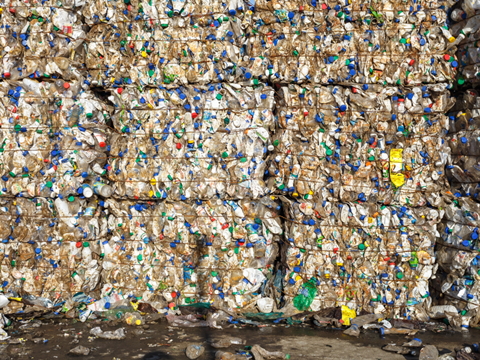
Searious Business, Maastricht University, and TOMRA are among the current signatories of a campaign urging the EU to address the ‘broken economics’ of the plastics recycling industry, including high recyclate costs and recycling plant closures.
The Elephant in the Room – Ring the Bell for Recycling campaign aims to address the ‘existential crisis’ faced by Europe’s recycling industry, despite the 12.5 million tonnes of installed capacity and €5 billion in investments between 2020 and 2023.
As recycling plants across the continent are forced to close their doors, Searious Business CEO Willemijn Peeters warns that “Europe is sleepwalking toward the collapse of its recycling industry — unless urgent action is taken now.”
Fears have arisen that there will be no viable recyclers left by the time the Packaging and Packaging Waste Regulation comes into force, which would leave industries reliant on virgin plastics and ‘underpriced’ imports.
Virgin plastics remain cheaper than plastic recyclate, which the coalition attributes to fossil fuel subsidies. This is described as an ‘unfair economic advantage’ that creates an uneven playing field for recycled plastics.
In response, the signatories recommend that policymakers use extended producer responsibility (EPR) and market-based incentives to ensure profitability and close the cost disparity between virgin and recycled plastics.
Fossil fuel subsidies should also be phased out, the coalition says, and external environmental costs should be internalized – a transition hoped to correct market distortions.
In order to make high-quality feedstock more accessible, the EU is encouraged to invest in infrastructure and innovation. Financing tools like credit guarantees and EU-level funding could help support recyclers’ competitiveness.
The Packaging and Packaging Waste Regulation should also enforce ambitious recycled content targets, the signatories say, while strict standards and certification for imported recyclates could help maintain quality, safety, and traceability.
At the same time, producers, converters, and brands are prompted to increase their utilization of recycled content and generate demand for European recyclates, which is then hoped to spur innovation across the plastics value chain.
Recyclers, brands, policymakers, and stakeholders are also invited to sign the coalition’s Industry Statement. Once the campaign is over, the signed statement will be formally delivered to the European Commission on behalf of the industry.
A symbolic Elephant High Striker will tour exhibition stands at this year’s K-Messe, taking place from 8th – 15th October in Düsseldorf. Participants will be encouraged to ring a real bell and join the movement.
“The elephant in the room is undeniable: recyclability alone cannot solve Europe’s plastic waste crisis,” Peeters continues. “Without systemic change, Europe will miss its recycling and recycled content targets. It’s time to ring the bell for recycling reform.
“This is not just about waste management—it’s about Europe’s future competitiveness and climate commitments. By standing together, we can ensure recycling has a fighting chance.”
Other signatories include EREMA, Sintac Recycling, FIMIC, OCS, Bas van den Ende – Kunststof Recycling, Nordson, SKZ, HolyPoly, Berga Recycling, Healix, De Paauw, Circle Economy, Velzy, and VDMA.
Plastics Recyclers Europe recently issued its own warning that Europe’s plastic recycling industry is ‘facing imminent collapse’ – an outcome it blames on cheap recyclate imports, declining demand for EU-made recyclates, growing economic pressures, and ‘excessive red tape’.
Its president, Tom Emans, provided us with a six-point checklist to save Europe’s plastics recycling industry, ranging from improved transparency to clean energy.
If you liked this story, you might also enjoy:
The ultimate guide to the Packaging and Packaging Waste Regulation in 2025
How are the top brands progressing on packaging sustainability?
Everything you need to know about global packaging sustainability regulation in 2025
The key to increasing the use of reusable packaging in supermarkets














No comments yet